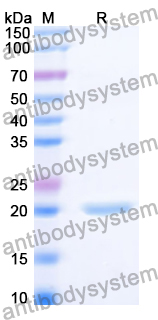Catalog No.
YHH04901
Expression system
E. coli
Species
Homo sapiens (Human)
Protein length
Met1-Ser171
Predicted molecular weight
20.98 kDa
Nature
Recombinant
Endotoxin level
Please contact with the lab for this information.
Purity
>90% as determined by SDS-PAGE.
Accession
Q15256
Applications
ELISA, Immunogen, SDS-PAGE, WB, Bioactivity testing in progress
Form
Lyophilized
Storage buffer
Lyophilized from a solution in PBS pH 7.4, 0.02% NLS, 1mM EDTA, 4% Trehalose, 1% Mannitol.
Reconstitution
Reconstitute in sterile water for a stock solution. A copy of datasheet will be provided with the products, please refer to it for details.
Shipping
In general, proteins are provided as lyophilized powder/frozen liquid. They are shipped out with dry ice/blue ice unless customers require otherwise.
Stability and Storage
Use a manual defrost freezer and avoid repeated freeze thaw cycles. Store at 2 to 8°C for one week. Store at -20 to -80°C for twelve months from the date of receipt.
Alternative Names
R-PTP-R, Receptor-type tyrosine-protein phosphatase R, NC-PTPCOM1, PTPRQ, Ch-1PTPase, PTPRR, Protein-tyrosine phosphatase PCPTP1, ECPTP
Adipose-Derived Mesenchymal Stem Cells (ADSCs) Have Anti-Fibrotic Effects on Lung Fibroblasts from Idiopathic Pulmonary Fibrosis (IPF) Patients., PMID:39768142
Transfer of miR-100 and miR-125b increases 3D growth and invasiveness in recipient cancer cells., PMID:39697634
miR-100 and miR-125b Contribute to Enhanced 3D Growth and Invasiveness and can be Functionally Transferred to Silence Target Genes in Recipient Cells., PMID:38826470
Re-expression of epigenetically silenced PTPRR by histone acetylation sensitizes RAS-mutant lung adenocarcinoma to SHP2 inhibition., PMID:38280930
[Risk modeling based on HER-2 related genes for bladder cancer survival prognosis assessment]., PMID:37807731
Parvimonas micra activates the Ras/ERK/c-Fos pathway by upregulating miR-218-5p to promote colorectal cancer progression., PMID:36627634
Protein Tyrosine Phosphatase Receptor Type R (PTPRR) Reduces AChR Clustering by Dephosphorylating MuSK., PMID:36105254
Quercetin inhibits the proliferation of multiple myeloma cells by upregulating PTPRR expression., PMID:34558606
Comprehensive high-throughput meta-analysis of differentially expressed microRNAs in transcriptomic datasets reveals significant disruption of MAPK/JNK signal transduction pathway in Adult T-cell leukemia/lymphoma., PMID:34187521
Association of Extracellular Signal-Regulated Kinase Genes With Myopia: A Longitudinal Study of Chinese Children., PMID:34122509
Dual RNA-Seq characterization of host and pathogen gene expression in liver cells infected with Crimean-Congo Hemorrhagic Fever Virus., PMID:32251473
Identification of PTPRR and JAG1 as key genes in castration-resistant prostate cancer by integrated bioinformatics methods., PMID:32133801
Genistein Modulates Signaling Pathways and Targets Several Epigenetic Markers in HeLa Cells., PMID:31766427
Protein tyrosine phosphatase receptor type R (PTPRR) antagonizes the Wnt signaling pathway in ovarian cancer by dephosphorylating and inactivating β-catenin., PMID:31653698
Downregulation of Protein Tyrosine Phosphatase Receptor Type R Accounts for the Progression of Hirschsprung Disease., PMID:31024255
Novel molecular mechanisms for the adaptogenic effects of herbal extracts on isolated brain cells using systems biology., PMID:30466987
Identification of Novel Functional Variants of SIN3A and SRSF1 among Somatic Variants in Acute Myeloid Leukemia Patients., PMID:29764005
Identification of molecular biomarkers for pancreatic cancer with mRMR shortest path method., PMID:28611293
Polymorphism of ERK/PTPRR Genes in Major Depressive Disorder at Resting-State Brain Function., PMID:28467119
The KIM-family protein-tyrosine phosphatases use distinct reversible oxidation intermediates: Intramolecular or intermolecular disulfide bond formation., PMID:28389559
Nine differentially expressed genes from a post mortem study and their association with suicidal status in a sample of suicide completers, attempters and controls., PMID:28327445
Genetic ablation of phosphatidylcholine transfer protein/StarD2 in ob/ob mice improves glucose tolerance without increasing energy expenditure., PMID:28183446
Expansion of divergent SEA domains in cell surface proteins and nucleoporin 54., PMID:27977898
Hypermethylated ZNF582 and PAX1 are effective biomarkers for detection of oral dysplasia and oral cancer., PMID:27865370
Transcriptomic gene-network analysis of exposure to silver nanoparticle reveals potentially neurodegenerative progression in mouse brain neural cells., PMID:27131904
Protein tyrosine phosphatase PTP-RR regulates corticosteroid sensitivity., PMID:27013170
PTPRR regulates ERK dephosphorylation in depression mice model., PMID:26773914
Genome-wide association study of IgA nephropathy using 23 465 microsatellite markers in a Japanese population., PMID:26202575
Androgen-regulation of the protein tyrosine phosphatase PTPRR activates ERK1/2 signalling in prostate cancer cells., PMID:25592066
Protein tyrosine phosphatase receptor type R is required for Purkinje cell responsiveness in cerebellar long-term depression., PMID:25571783
Methylated ZNF582 gene as a marker for triage of women with Pap smear reporting low-grade squamous intraepithelial lesions - a Taiwanese Gynecologic Oncology Group (TGOG) study., PMID:25134998
Protein tyrosine phosphatase receptor R and Z1 expression as independent prognostic indicators in oral squamous cell carcinoma., PMID:25043478
Interaction of kinase-interaction-motif protein tyrosine phosphatases with the mitogen-activated protein kinase ERK2., PMID:24637728
Protein tyrosine phosphatase receptor type R deficient mice exhibit increased exploration in a new environment and impaired novel object recognition memory., PMID:24556203
High methylation rate of LMX1A, NKX6-1, PAX1, PTPRR, SOX1, and ZNF582 genes in cervical adenocarcinoma., PMID:24407576
Thymoquinone regulates gene expression levels in the estrogen metabolic and interferon pathways in MCF7 breast cancer cells., PMID:24270600
Immunohistochemical and Western blot analysis of two protein tyrosine phosphatase receptors, R and Z1, in colorectal carcinoma, colon adenoma and normal colon tissues., PMID:24242166
Influence of differentially expressed genes from suicide post-mortem study on personality traits as endophenotypes on healthy subjects and suicide attempters., PMID:24241531
The differential regulation of p38α by the neuronal kinase interaction motif protein tyrosine phosphatases, a detailed molecular study., PMID:23932588
Association mapping of the high-grade myopia MYP3 locus reveals novel candidates UHRF1BP1L, PTPRR, and PPFIA2., PMID:23422819
Effects of protonation state of Asp181 and position of active site water molecules on the conformation of PTP1B., PMID:23239271
Protein tyrosine phosphatase receptor-like genes are frequently hypermethylated in sporadic colorectal cancer., PMID:23096495
[Association between protein tyrosine phosphatase receptor type R gene and major depressive disorder]., PMID:22509552
Epigenetic silencing of PTPRR activates MAPK signaling, promotes metastasis and serves as a biomarker of invasive cervical cancer., PMID:22330137
Tyrosine phosphatases as a superfamily of tumor suppressors in colorectal cancer., PMID:22146137
Gender-specific role of the protein tyrosine phosphatase receptor type R gene in major depressive disorder., PMID:22100128
PTPBR7 binding proteins in myelinating neurons of the mouse brain., PMID:21850207
Identification of PTPN23 as a novel regulator of cell invasion in mammary epithelial cells from a loss-of-function screen of the 'PTP-ome'., PMID:21724833
The protein tyrosine phosphatase receptor type R gene is an early and frequent target of silencing in human colorectal tumorigenesis., PMID:20015382
Molecular characterization of young and mature odontoblasts., PMID:19555781

